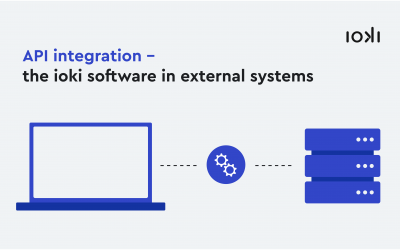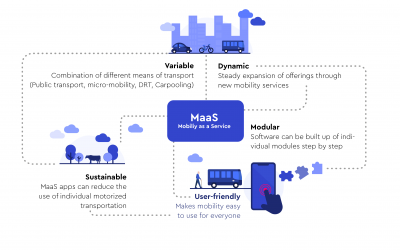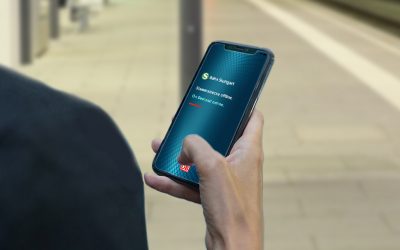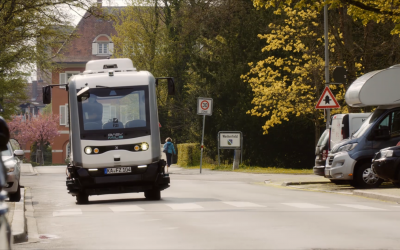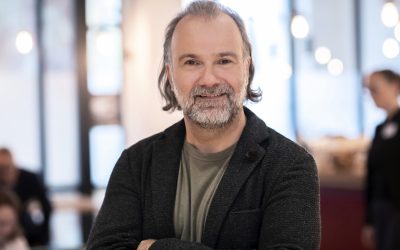API integration – the ioki software in external systems
What is behind the ioki API? “We are continuously working on our data storage and also on the connection and integration of our system into external systems,” says Andreas Schwarzkopf, Head of Backend Engineering at ioki. The Application Programming Interface, or API, can be used to integrate software into external systems. In the ioki case, this means integrating our operating system for digital mobility primarily into external Mobility as a Service (MaaS) platforms.
Perspectives from Andreas Schwarzkopf
Andreas has been out and about in the mobility universe since 2010: from flinc, to the DB fleet service, all the way to his position as Head of Backend Engineering at ioki, Andreas has already stopped off at a number of stations. At ioki, he uses his 20+ years of IT expertise to develop new architectures and individual components for our operating system. In addition, he enhances existing architectures, among other things to open up our operating system to other transport providers – in a customer-centric and demand-oriented way. Andreas, thank you very much for taking the time.
Perspectives from Tyll Diebold
Tyll Diebold is a research assistant at the Institute for Transport Planning and Logistics at TU Hamburg. He has provided scientific support for the ioki Hamburg project from the very beginning and recently published the study “On-demand services as a component of public transport”. After completing his Master of Science in « Logistics, Infrastructure and Mobility » at TU Hamburg in 2016, he initially worked for an engineering office for a year before returning to TU Hamburg to complete his doctorate.
Perspectives from Andrés Vargas Díaz
Andrés studied civil engineering and specialised in the planning and operation of transport systems as a part of his studies. He joined ioki’s Mobility Analytics team in 2019 and was influential in creating the study on public mobility in Germany.
Mobility as a Service: full speed ahead towards the mobility turnaround
Whenever we talk about the transport revolution and the associated restructuring of public transport, we cannot avoid the term « Mobility as a Service », abbreviated MaaS. But what exactly is « MaaS » and how can the digital approach help to sustainably advance the transport revolution?
Digital rail and on-demand rail replacement services
In Germany, up to 125 kilometres of rail are to be modernized by 2025. During the modernization, passengers will have to switch from rail to rail replacement services. This is also the case for passengers on the Stuttgart S-Bahn, while the main line there is being modernized this summer. Nevertheless, this rail replacement service is different, because: On weekends and weekend nights, it is main line offline – S-Bahn On-Demand online.
Perspectives from Alina Schuprin
As International Business Development Manager Alina Schuprin supports ioki’s mission to implement integrated mobility solutions not only on german roads, but all over Europe. Having a Master degree in industrial engineering Alina is experienced in anything that comes with digitalisation and its impact on established business areas. At ioki she combines this know-how with her personal goal to generate a positive impact on the environment with her daily work.
Perspectives from Jakob Kammerer
Jakob Kammerer is Head of Autonomous Mobility at ioki and thus responsible for developing the software that connects driverless vehicles with our operating system for digital mobility. After completing his B.Sc. in automotive engineering at the Technical University of Ilmenau in 2014, he progressed through several positions at Daimler, General Motors and the PSA Group into the field of mobility. Today we talk to Jakob about the supreme discipline of modern mobility: autonomous driving.
All aboard, please! Next stop: autonomous driving
ioki has already achieved a number of milestones in the field of autonomous driving, from test operations on closed terrain to linking an On-Demand-Booking-System with autonomous driving vehicles. In March 2021, the « Law on Autonomous Driving » was presented in the Bundestag, which clearly shows: The topic is gaining more weight not only among mobility designers, but also at the political level. In the bill presented, legal framework conditions were defined for fully automated driving in certain operating areas. In addition, further investments are to be made in research and development in the field to make the mobility of the future safer, more environmentally friendly and, above all, user centered. « Germany will be the first country in the world to bring autonomous vehicles out of the research labs and onto the road, » says Federal Minister Andreas Scheuer – ioki has already been working on this for several years and shows itself to be an innovator making progress here.
Perspectives from Jörg Starr
Jörg Starr has already passed through several stations in the automotive industry. He has already worked as a manager at Smart and Daimler. Today, the hydrogen mobility expert works for Audi. In addition, Jörg Starr is chairman of the Clean Energy Partnership (CEP). Technology, mineral oil and energy companies, gas producers and car manufacturers are working together to establish emission-free mobility with hydrogen and fuel cells across the board.
Why transport planning must be agile
Mobility is a highly complex construct, consisting a wide variety of puzzle pieces and dependent on diverse influencing variables. Since the beginning of professional planning of publicly oriented mobility services, public transport authorities and transport companies have been confronted with a multitude of questions and possible answers.
Car-free city: meaningful reform or wishful thinking?
Looking at our society from a above perspective without any prior knowledge, it seems as if the idea of a planet with endless resources has strongly manifested itself in the minds of people. A prime example of this way of thinking is the current use of motorised individual transport. If I want to drive, I have a seat in my car, fill up the tank, fasten my seat belt, press the accelerator and drive off. This way of thinking is dangerous. Motorised individual transport requires that resources are consumed – for a car that weighs 1.5 tonnes on average, that means about 70 tonnes of material only in production. In addition, the car pollutes the environment with every use and takes up too much space, especially in large cities.

